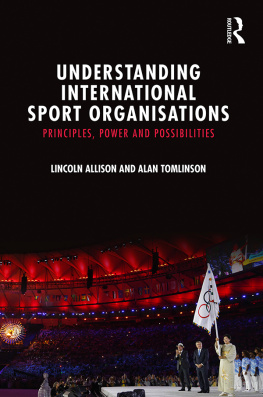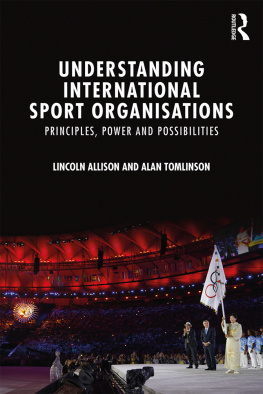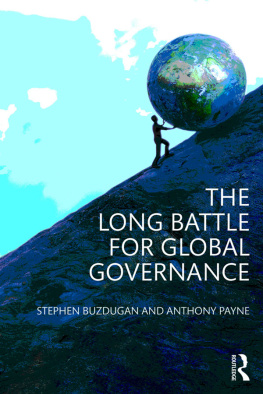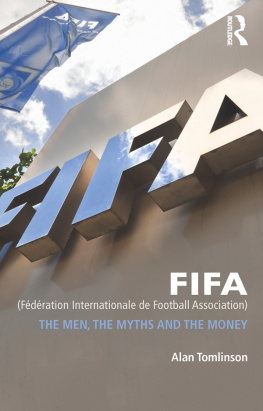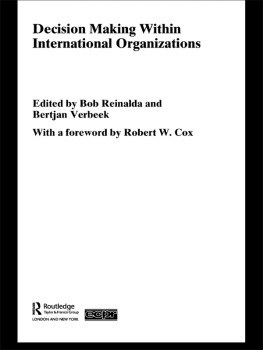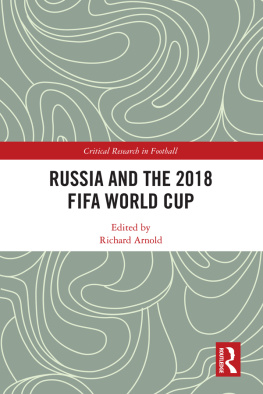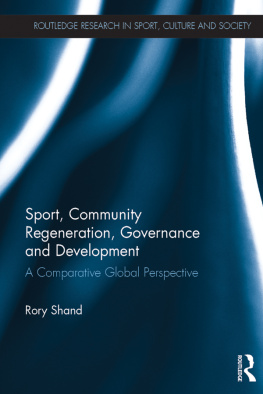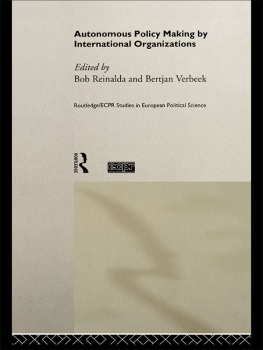In Understanding International Sport Organisations: Principles, power and possibilities, Lincoln Allison and Alan Tomlinson offer a critical, nuanced, evidence-driven assessment of sporting international non-governmental organisations (or, SINGOs). This bold interrogation of international sport governance unveils a unique brand of messianic clientelism as well as a fragile set of contradictions crackling at the systems core. The book explodes the myth that SINGOs somehow sidestep politics while exposing these organisations systematic dearth of accountability. Understanding International Sport Organisations is resolutely interdisciplinary; engaging history, international relations, politics, sociology, and sport studies. It is a vital contribution that enhances our understanding of the far-reaching, manytentacled organisations that dominate the modern-day sports landscape.
Jules Boykoff, Professor of Political Science, Pacific University, USA
Allison and Tomlinsons conceptualisation of SINGOs, and the book as a whole, is an important advance in the study of international sport. The focus on the IOC and FIFA as the two mega-SINGOs is warranted but does not exclude other significant non-state actors who influence the sport/diplomacy landscape. The two authors are supremely well-placed to draw on their many years of professional expertise to provide a balanced argument between the historical evolution of these organisations and their contribution to contemporary international relations. As such the book has much to say to scholars of sport, be they historians, sociologists or political scientists.
J. Simon Rofe, Senior Lecturer in Diplomatic and International Studies, SOAS University of London, UK
First published 2017
by Routledge
2 Park Square, Milton Park, Abingdon, Oxon OX14 4RN
and by Routledge
711 Third Avenue, New York, NY 10017
Routledge is an imprint of the Taylor & Francis Group, an informa business
2017 Lincoln Allison and Alan Tomlinson
The right of Lincoln Allison and Alan Tomlinson to be identified as authors of this work has been asserted by them in accordance with sections 77 and 78 of the Copyright, Designs and Patents Act 1988.
All rights reserved. No part of this book may be reprinted or reproduced or utilised in any form or by any electronic, mechanical, or other means, now known or hereafter invented, including photocopying and recording, or in any information storage or retrieval system, without permission in writing from the publishers.
Trademark notice: Product or corporate names may be trademarks or registered trademarks, and are used only for identification and explanation without intent to infringe.
British Library Cataloguing in Publication Data
A catalogue record for this book is available from the British Library
Library of Congress Cataloging in Publication Data
Names: Allison, Lincoln, author. | Tomlinson, Alan, author.
Title: Understanding International Sport Organisations : Principles, Power
and Possibilities / Lincoln Allison and Alan Tomlinson.
Other titles: Understanding International Sport Organizations
Description: Abingdon, Oxon ; New York, NY : Routledge, 2017. |
Includes bibliographical references and index.
Identifiers: LCCN 2016045968 | ISBN 978-1-138-82048-7 (hardback) |
ISBN 978-1-138-82049-4 (pbk.) | ISBN 978-1-315-74387-5 (ebook)
Subjects: LCSH: Sports administrationInternational cooperation. |
Sports and globalization.
Classification: LCC GV713 A5 2017 | DDC 796.06/9dc23LC record
available at https://lccn.loc.gov/2016045968
ISBN: 978-1-138-82048-7 (hbk)
ISBN: 978-1-138-82049-4 (pbk)
ISBN: 978-1-315-74387-5 (ebk)
Typeset in Bembo
by FiSH Books Ltd, Enfield
Context
On 3 December 2010 a twenty-two person executive committee of FIFA (Fdration Internationale de Football Association) chose Qatar as the location for the 2022 mens football World Cup. The other countries on the short list had been Australia, the United States of America, Japan and South Korea. All of these except Australia had previously been hosts or joint hosts. The Russian Federation was also selected as host for the 2018 tournament. The case for Qatar, as put by Sepp Blatter, the president of FIFA (though he had, apparently, voted for the USA himself), was primarily that one of twenty-two predominantly Arab countries should be offered the chance of hosting if the tournament were to be considered a genuinely world event. Qatar was one of the richest of these countries and believed to be one of the most stable. The emirate had already staged the Asian Games and the Asian football championships without mishap and established its capacity to deal with major events. Sport, along with tourism and art, was a major strand of its national strategy and economic planning, to guarantee an affluent future after the oil ran out.
Football fans, institutions and constituencies were enraged. Qatar is not, technically, the smallest place in population to host a World Cup because it has a current population of 1.9 million and Uruguay in 1930 had only about 1.7 million. But it is, of course, ridiculously small for such a purpose compared with immediate predecessors such as Germany and South Africa. In 1930 at the inaugural event in Uruguay, the away fans were measurable in dozens; in 2014 England alone took more than 10,000 supporters to Brazil. One estimate has it that Qatar is spending 138 billion on the World Cup, more than sixty times what was spent in South Africa. Any legacy of such investment, to invoke the criteria used by the International Olympic Committee (IOC), is likely to consist entirely of white elephants. The time zone in Qatar is two hours different from most of Western Europe, but eight hours behind most of East Asia and at least six hours ahead of South America, those being the three main global markets for televised football. Qatar is an Islamic autocracy whose laws are based on Islamic principles and is, therefore, in fundamental opposition to Western liberalism and democracy. Homosexuality is illegal and there are normally only a few places where alcohol can be consumed and a bureaucratic process or insider patronage is required for access.
The problems posed by the climate are even greater. During the period of the tournament temperatures can rise as high as fifty degrees Celsius. (Both of us have spent time in the United Arab Emirates and it is obvious that the July period established for the World Cup within the global sporting calendar is barely thinkable in such conditions.) It was argued that forms of air conditioning might be able to lower temperatures by as much as twenty degrees, but this would not, of course, alleviate conditions for fans outside of match times. Nor would it do anything for the workers who had to bring the infrastructure into being, numerous of whom were reported to have died whilst working in conditions of quasi-slavery.
The December 2010 World Cup decisions brought the attention of the world, and of the world media, to the nature and workings of international sports organisations such as FIFA, in an amplified version of the scandals revealed in the practices of IOC members in the later 1990s. It has become clear that the Qatar decision has had broad and permanent consequences for the international governance of sport. The decision was a kind of

